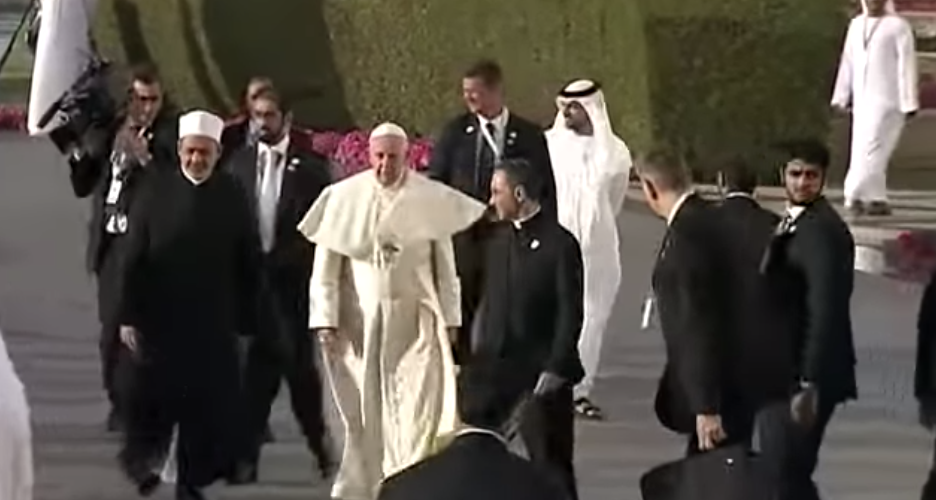Despite the non-stop hubbub in U.S. politics that dominates the news, and the sexual molesting crisis that consumes Catholic media outlets, history’s first papal visit to the Arabian Peninsula achieved some spot coverage. But journalists now need to offer richer analysis of the longer-term significance of the February events in the United Arab Emirates (UAE).
You want pertinent news angles? You want some valid follow-up stories?
Islam and Catholicism each claim the allegiance of more than one billion souls. Terrorists claiming inspiration from Islam vex the entire region, with fellow Muslims frequently among the victims of carnage, while targeted Christians have been pushed out of their faith’s ancestral heartland. In the U.S. State Department’s latest religious freedom report, six of the 10 worst nations “of particular concern” are majority Muslim (Iran, Pakistan, Sudan, Saudi Arabia, Tajikistan, Turkmenistan), with others on State’s “special watch” listing.
There was substance alongside the pageantry and photo ops in the UAE, a joint declaration issued by Pope Francis and Grand Imam Ahmad Al-Tayyeb, who leads venerable Al-Azhar University in Cairo. This is generally considered the chief intellectual center in Islam’s dominant Sunni branch (though long tainted by links with Egypt’s authoritarian regimes). Tayyeb is no pope but as authoritative as any figure in Sunnism. The joint statement results from years of intricate diplomacy between the Vatican and Al-Azhar.

Among the many moral evils addressed, the pope and imam called upon the world’s leaders “to stop using religions to incite hatred, violence, extremism and blind fanaticism, and to refrain from using the name of God to justify acts of murder, exile, terrorism and oppression,” adding that “God, the Almighty, has no need to be defended by anyone and does not want His name to be used to terrorize people. … Terrorism must be condemned in all its forms and expressions”
The declaration also proclaimed that “each individual enjoys the freedom of belief, thought, expression and action” and opposed forcing people “to adhere to a certain religion.” It stated that “protection of places of worship — synagogues, churches and mosques — is a duty” under both religious teachings and international law. It upheld women’s rights to education, employment and political action. And so forth, including some interesting theological commentary on God creating the various world religions.
Many media accounts omitted Tayyeb’s other role as chairman of the Muslim Council of Elders, formed in 2014 to foster peace and address conflicts within Islam. During the pope’s visit the council sponsored a conference for 700 leaders representing all major world religions. And the UAE announced plans to build a new church in honor of Francis in Abu Dhabi alongside a mosque named for Tayyeb. (Press accounts said the UAE already allows 76 non-Muslim houses of worship, compared with zero in neighboring Saudi Arabia.)
Will deeds across the Muslim world match the leaders’ words?
The content was easy enough for the Pope to endorse. The important aspect going forward is the extent to which Muslim religious and political authorities, and ordinary Muslims, unite with Tayyeb’s viewpoint, whether they want to effectively overcome the radicals in their midst, and if so how to develop mechanisms to end the ongoing turbulence in global Islam.
Reporters should reconsider the similar and more dramatic “A Common Word” declaration from 2007, fostered by an institute in Jordan and addressed to world Christian leaders by an impressive international lineup of 138 Muslim thinkers, Tayyeb among them. Yale Divinity School then organized a pan-Christian response from an unusually broad group of Catholic, Orthodox, “mainline” Protestant and evangelical Protestant figures.
Has that 2007 initiative had any impact within Islam?
In light of that what’s the potential significance of the UAE declaration? Such questions could be posed to North American signers from 2007, among them Akbar Ahmed of American University, Hamza Yusuf of Zaytuna College, Ingrid Mattson of Huron University College, Seyyed Hossein Nasr of George Washington University, and Muzammil Siddiqui, chairman of the Fiqh Council of North America.
FIRST IMAGE: Screen shot from RUPTLY coverage, online.










